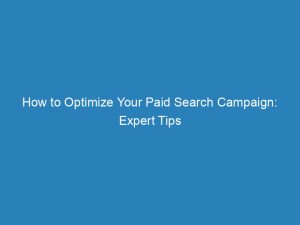In the vast digital landscape, where millions of websites compete for attention, capturing the interest of potential customers is no small feat. But fear not, dear reader, for there exists a powerful tool that can propel your brand to the forefront of search engine results: the paid searchcampaign.
By carefully selecting appropriate keywords and implementing clever bidding strategies, marketers can unlock a treasure trove of opportunities. In this captivating journey, we will delve into the secrets of paid search campaigns, unraveling the mysteries behind connecting with customers, achieving performance goals, and ultimately, unleashing the full potential of return on investment.
Prepare to be astonished as we navigate through this captivating universe of pay-per-click possibilities.
| Item | Details |
|---|---|
| Topic | How to Optimize Your Paid Search Campaign: Expert Tips |
| Category | Ads |
| Key takeaway | In the vast digital landscape, where millions of websites compete for attention, capturing the interest of potential customers is no small feat. |
| Last updated | December 27, 2025 |
paid-search-campaign">paidsearchcampaign
A paid search campaign refers to an advertising strategy that involves paying to have ads displayed prominently in search engine results pages. The goal of a paid search campaign is to connect with customers, maximize return on investment (ROI), and achieve performance goals.
By utilizing Google’s AI and Smart Bidding, marketers can choose the right keywords and set bids that automatically optimize for better search results. Paid search campaigns offer numerous benefits, including audience targeting, cost control, and data-driven advertising.
It is a partnership between marketers and search engines, where marketers pay based on clicks, impressions, or responses generated. Regardless of the product or service, anyone can benefit from paid search advertising.
It allows businesses to promote gated content, webinars, and free trials and enables local businesses to target specific audiences through search advertising networks. To start a campaign, it is recommended to have limited budgets and conduct audience testing to ensure effectiveness and cost-efficiency.
Overall, paid search campaigns provide a powerful tool for businesses to reach their target audiences, generate conversions, and achieve exceptional ROI.Key Points:
- Paid search campaign involves paying for ads to be displayed prominently in search engine results pages
- Goal of a paid search campaign is to connect with customers, maximize ROI, and achieve performance goals
- Google’s AI and Smart Bidding can optimize keywords and bids for better search results
- Benefits of paid search campaigns include audience targeting, cost control, and data-driven advertising
- Marketers pay based on clicks, impressions, or responses generated
- Paid search campaigns allow businesses to promote gated content, webinars, and free trials, and target specific audiences through search advertising networks.
Sources
https://ads.google.com/intl/en_us/home/campaigns/search-ads/
https://directiveconsulting.com/blog/paid-search-campaign/
https://ads.google.com/intl/en_au/home/resources/articles/what-is-paid-search/
https://www.brafton.com/blog/paid-search-blog/what-is-paid-search/
Check this out:
💡 Pro Tips:
1. Continuously monitor and adjust keyword bids in your paid search campaign to optimize performance and maximize ROI.
2. Use remarketing lists for search ads to reconnect with previous website visitors and encourage them to convert.
3. Conduct thorough competitor research to identify gaps and opportunities in the paid search market.
4. Utilize ad extensions, such as sitelinks and call extensions, to provide additional information and improve the visibility and effectiveness of your paid search ads.
5. Regularly test different ad copy variations and messaging to identify the most compelling and effective ads for your audience.
Choosing The Right Keywords For A Paid Search Campaign
When it comes to running a successful paid search campaign, choosing the right keywords is crucial. Keywords are the search terms that users type into search engines when looking for products or services.
By selecting the right keywords, you can ensure your ads are displayed to relevant audiences and increase the chances of generating conversions. Here are some tips for selecting the right keywords for your paid search campaign:
- Conduct thorough keyword research: Start by brainstorming a list of potential keywords that are relevant to your business. Then, use keyword research tools to analyze the search volume and competition for each keyword.
Aim for a mix of broad keywords (e.g., “shoes”) and long-tail keywords (e.g., “women’s running shoes with arch support”).
- Consider user intent: It’s crucial to understand the intent behind different keywords and align them with your campaign goals. Are users looking for information, ready to make a purchase, or comparing different options?
Tailor your keyword selection based on the intent of your target audience.
Leverage negative keywords: Negative keywords are search terms that you want to exclude from triggering your ads. For example, if you sell high-end shoes, you might want to exclude keywords like “cheap” or “discounted” to avoid attracting users looking for inexpensive options.
Monitor and refine: Once your campaign is live, monitor the performance of your keywords regularly. Identify which keywords are driving the most traffic and conversions, and adjust your keyword strategy accordingly.
Remove underperforming keywords and invest more in the ones that are generating results.
Using these strategies, you can optimize your paid search campaign by choosing the right keywords that will attract the right audience and drive conversions.
Using Google’s AI And Smart Bidding For Better Search Results
Google’s AI and Smart Bidding capabilities have revolutionized the world of paid search advertising. Smart Bidding is an automated bidding strategy that uses machine learning algorithms to set bids in real-time.
It analyzes various factors, such as the user’s device, location, and time of day, to determine the optimal bid for each auction.
By using Google’s AI and Smart Bidding, you can benefit from:
Improved campaign performance: Smart Bidding takes into account a wide range of data points and performance indicators to optimize bidding for maximum return on investment (ROI). It adjusts bids in real-time, ensuring your ads are shown to the most valuable users at the right time.
Enhanced targeting: Google’s AI technology allows for more precise audience targeting. It can identify patterns and behaviors among your target audience, enabling you to reach the right people with your ads and increasing the chances of conversions.
Time savings: Smart Bidding automates the bidding process, saving you time and effort. Instead of manually adjusting bids and monitoring performance, the AI algorithms handle these tasks for you, allowing you to focus on other aspects of your campaign.
Smart Bidding For Maximizing ROI And Achieving Performance Goals
Smart Bidding is designed to maximize your return on investment and achieve specific performance goals. The system uses advanced machine learning algorithms to adjust your bids automatically based on various factors.
New insights from FroggyAds platform analytics.
Here are some ways Smart Bidding can help you optimize your paid search campaign:
Maximize conversions: If your goal is to generate as many conversions as possible within a given budget, you can set a target for Smart Bidding. The AI will then adjust your bids to maximize the number of conversions while staying within your budget constraints.
Target cost per acquisition (CPA): If your priority is achieving a specific cost per acquisition, Smart Bidding can help. By setting a target CPA, the system will adjust your bids to keep your average acquisition cost as close to your target as possible.
Enhance return on ad spend (ROAS): For businesses focused on maximizing their return on ad spend, Smart Bidding can help optimize bids to achieve a specific target ROAS. The AI algorithms analyze historical data and user behavior to adjust bids accordingly, ensuring your ad spend is allocated to the most profitable opportunities.
Improve click-through rates (CTR): Smart Bidding also takes into account the likelihood of users clicking on your ads. By analyzing historical CTR data, the system can adjust bids to prioritize ad placements where users are more likely to click, thus increasing your CTR.
By leveraging Smart Bidding and setting specific performance goals, you can make the most of your paid search campaign and optimize your results.
Connecting With Customers While Managing The Budget Effectively
When running a paid search campaign, it’s essential to find the right balance between connecting with customers and managing your budget effectively. Here are some strategies to help you achieve both objectives:
Understand your audience: Take the time to understand your target audience’s demographics, interests, and behaviors. This information will help you craft compelling ad copy that resonates with your customers and increases the likelihood of engagement.
A/B test your ads: To maximize the impact of your ad copy, conduct A/B tests to determine which versions resonate best with your audience. Test different headlines, call-to-action statements, and ad extensions to identify the most effective combinations.
Set a budget: Be clear about how much you are willing to spend on your paid search campaign. Set a daily or monthly budget that aligns with your marketing goals and overall business objectives.
This will help you manage your ad spend effectively and prevent overspending.
Monitor performance: Continuously monitor the performance of your ads and adjust your strategy accordingly. Identify which keywords, ad groups, or campaigns are delivering the best results and focus your budget on those areas.
Remarketing: Use remarketing techniques to connect with customers who have already shown interest in your products or services. By targeting users who have visited your website or interacted with your ads in the past, you can increase the chances of conversion and maximize your ROI.
By implementing these strategies, you can effectively manage your budget while connecting with customers and deriving maximum value from your paid search campaign.
Buy Traffic • Native Ad Network • Advertising Platform for Marketers











